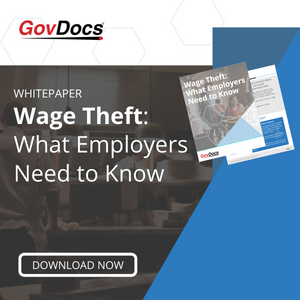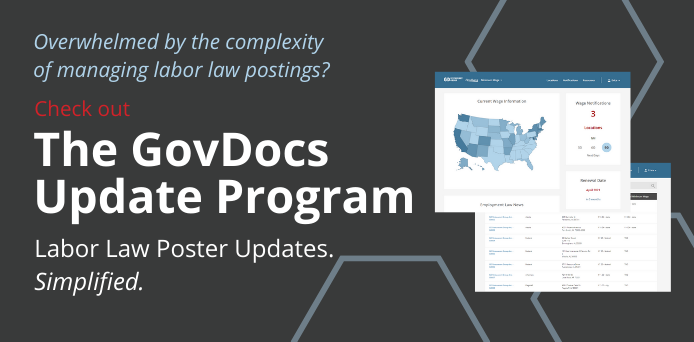
Labor Law Poster Glossary
Our labor law poster glossary offers definitions of terms that may vary by jurisdiction. This list includes general terms, as well as commonly seen posting types. For a definition specific to a jurisdiction, refer to the term within that jurisdiction’s statutes and regulations.
You can also check out our:
-A-
Age Discrimination Posting
A common type of labor law posting related to an employer’s obligations regarding hiring, promoting, demoting, terminating, etc., an employee based on age.
All-on-One
A type of labor law poster that includes either federal postings on one poster or state postings on one poster.
Applicant Postings
Employers are required to display certain postings for job applicants. Applicant postings must be displayed where job applicants can view the requisite postings if meeting at the employer’s building during the hiring process and/or provided electronically if part of the application process is online. Four federal postings are required for applicants: the Family and Medical Leave Act (FMLA), the Equal Employment Opportunity (EEO), the Employee Polygraph Protection Act (EPPA), and E-Verify when applicable.
Audit
An inventory of labor law posters to ensure compliance, conducted by in-house HR teams or government officials.
-B-
Ban the Box Posting
A common type of labor law posting related to laws that bar employers from asking about a job applicant’s criminal history until a later stage in the hiring process. These can also be called “fair chance” laws.
-C-
Combined Poster
A poster that contains the federal all-on-one and state all-on-one on one poster.
Conspicuous Place
An area in a workplace where labor law posters must be displayed, typically a break room or other space employees frequently visit.
COVID-19 Posting
A posting related to a law, ordinance, or executive order that was passed in response to the COVID-19 pandemic. Examples include the San Francisco Covid Employee Leave Protection and Oregon’s COVID-19 Hazards postings. Several postings also updated to include COVID-19 or public health emergency requirements based on amendments to existing law, such as New Jersey’s Family Leave Act posting.
-D-
Departments of Labor
Governmental agencies that manage the enforcement of employer compliance with labor standards. When legislation is passed that impacts employer posting requirements, the applicable department of labor is often tasked with releasing new or revised labor law postings reflecting the law’s changes.
-E-
Employee Polygraph Protection Act
A federal law, which prohibits most private employers from using lie detector tests before or during the course of employment, that carries an associated labor law posting
E-Verify
The nationwide program that helps employers determine whether employees are authorized to work in the U.S. All employers that use E-Verify must display the associated labor law posting, as well as employers in certain jurisdictions.
Equal Employment Opportunity
Every employer covered by nondiscrimination and equal employment opportunity laws is required to display the “Equal Employment Opportunity is the Law” posting.
-F-
Fair Labor Standards Act (FLSA)
A federal law that establishes the minimum wage, overtime, recordkeeping and child labor requirements for employers with workers covered by the act. All employees subject to the law must display the associated labor law poster.
Family and Medical Leave Act
A law, applying to employers with 50 or more employees within a 75-mile radius, that outlines workers’ rights for job-protected leave. All employers subject to the law must display the associated labor law poster.
Federal Contractor
Businesses or organizations that enter into an agreement with a department or agency of the U.S. government to perform a specific job. Such companies must display several postings, including the Service Contract Act/Walsh Healy, Right to Work and National Human Trafficking Resource Center postings.
Federal Defense Contractor
Businesses or organizations who have defense contracts with certain agencies of the U.S. Federal Government, such as the Department of Defense (DOD) and Department of Homeland Security (DHS). Such companies must display certain postings, including the DOD’s Whistleblower and Human Trafficking postings.
Fill-in-the-Blank Posting
A section of a labor law posting that requires employers to fill out specific information, often related to contact information, payday notices, insurer names, etc. Fill-in-the-Blanks are often found on, among others, Workers’ Compensation and Right to Know postings.
Fine
A penalty employers must pay for not displaying a labor law poster properly. For example, failure to display the FMLA posting carries a $100 fine.
Formatting Requirements
The size, color and font in which a labor law poster must be displayed.
-G-
-H-
Harassment Posting
A common type of labor law posting related to rules that protect employees right to work free from harassment in areas including, but not limited to, race, sex, disability, etc., such as Puerto Rico’s Workplace Harassment and Bullying Protocols posting.
Human Trafficking Posting
A common type of labor law posting that provides a local or national human trafficking hotline number and additional resources to access help or services as required under the applicable human trafficking law. This type of posting is among the fastest growing over the past several years.
-I-
Industry Posting
A labor law posting required of employers in specific industries, such as New York’s Hospitality Industry Minimum Wage posting.
-J-
Job Safety and Health Protection Posting
A common type of labor law posting that describes an employer’s obligations to provide a safe and healthy workplace for its employees and to comply with all applicable safety standards as well as other inspection, complaints, and citation information for the applicable jurisdiction.
Jurisdiction
A defined boundary for which a governmental entity has the authority to issue labor law postings, such as Oregon, Cook County, Ill., or New York City. There are about 22,050 such jurisdictions in the U.S.
-K-
Know Your Rights Posting
A common type of labor law posting related to equal employment opportunity laws. This information often includes employee rights regarding race, military status, age, disability, etc.
-L-
Living Wage Posting
A common type of labor law posting related to living wage laws — the lowest wage at which the wage earner and his/her family can afford the most basic costs of living — such as the Living Wage Table posting in Milwaukee, Wis.
-M-
Minimum Wage Posting
A common type of labor law posting with the applicable wages, hours worked, and overtime requirements under a particular jurisdiction’s minimum wage law. Nearly every minimum wage law or ordinance carries an associated labor law posting.
-N-
Non-English Posting
Postings to be displayed in a language other than English. These postings are often required depending on the number of non-English speakers a company has in its employ.
No Smoking Posting
A type of posting that prohibits smoking, often including tobacco, e-cigarettes, and/or marijuana, in public places or places of employment.
Notices
Similar to a labor law posting, some employment laws require employers to provide a notice, or a document outlining certain employment law requirements, directly to its employees at specific times during the term of employment. Notice requirements are typically separate from posting requirements, but sometimes the law provides that a notice can be satisfied by posting.
-O-
-P-
Paid Leave Posting
A common labor law posting related to paid leave laws. Nearly every paid leave law carries an associated labor law posting.
Planogram
A visual representation of which federal, state, county and city labor law posters must be displayed at a location.
Posting
A physical or digital poster related to an employment law, ordinance, or executive order that employers are generally required to conspicuously display in an area frequented by its employees. Required labor law postings depend on several factors, including the respective law, the issuing agency, and the jurisdiction.
Poster
A large printed item including several labor law postings employers must display.
Prevailing Wage Posting
A common type of labor law posting related to a prevailing wage law — typically referring to the rate of pay contractors and vendors must offer their employees when doing business with a government agency — such as New York City’s posting providing examples for construction workers and building service employees.
-Q-
QR Code
An image, able to be read by a mobile device, that informs location managers whether a labor law poster is up to date.
-R-
Remote Employee
An employee who primarily works from home instead of a traditional workplace. Employers are still required to provide applicable labor law posters to their remote employees, which companies often provide via their intranet or email.
Revision Date
The date on which a posting was updated.
Right to Know Posting
A common type of labor law posting that provides employees awareness that their employer must inform them of the health hazards and toxic substances at their workplace or worksite.
Right to Work Posting
A common type of labor law posting related to an individual’s right to work, irrespective of their nation of origin or immigration status.
-S-
Scam
An unsavory tactic some labor law poster vendors attempt. This can include mail regarding an urgent posting update, along with legal jargon and fines about noncompliance, fake audits, phony communication with location managers rather than corporate HR, and more.
Spanish-Language Posting
A labor law posting that must be displayed in Spanish. While many non-English postings are displayed depending on the composition of an organization’s employees, some Spanish postings are required for all employers.
-T-
Time Off for Voting Posting
In a recent trend, a type of labor law posting that outlines the employee’s right to take paid leave to vote, including dates and times of voting and hours as well as the amount of leave.
-U-
Unemployment Insurance Posting
A common type of labor law posting that provides information for eligible employees on their right to apply for unemployment insurance benefits if they have lost their job or had their work hours reduced. In certain jurisdictions, the Unemployment Posting must be obtained directly through the Insurance Carrier.
Update
A change to a labor law posting. A mandatory update requires employers to display a new posting or poster. A non-mandatory update does not require the poster to be replaced unless desired.
-V-
-W-
Whistleblower Posting
A common type of labor law posting that typically describes how employers cannot retaliate against employees for reporting violations of the law, reporting risks to health or safety, being involved in an investigation with the government, etc., such as the posting for Rhode Island’s Whistleblowers’ Protection Act.
Workers’ Compensation Posting
A common type of labor law posting that often provides steps for employees to review if a job injury occurs and who to report the injury to as well as workers’ compensation benefits. There are often fill-in-the-blank sections to these postings for reporting and safety phone numbers.
-X-
-Y-
Youth/Minor/Child Labor Postings
A common type of labor law posting that provides child labor requirements, including the types of jobs and hours particular minors can work. In some jurisdictions, employers are also required to post a schedule for minors of the hours work as well as their meal and rest periods.
-Z-
Created April 2022; Copyright © 2022 GovDocs, Inc. GovDocs is a registered trademark of GovDocs, Inc. This labor law poster glossary is intended for market awareness only. It is not to be used for legal advice or counsel.









